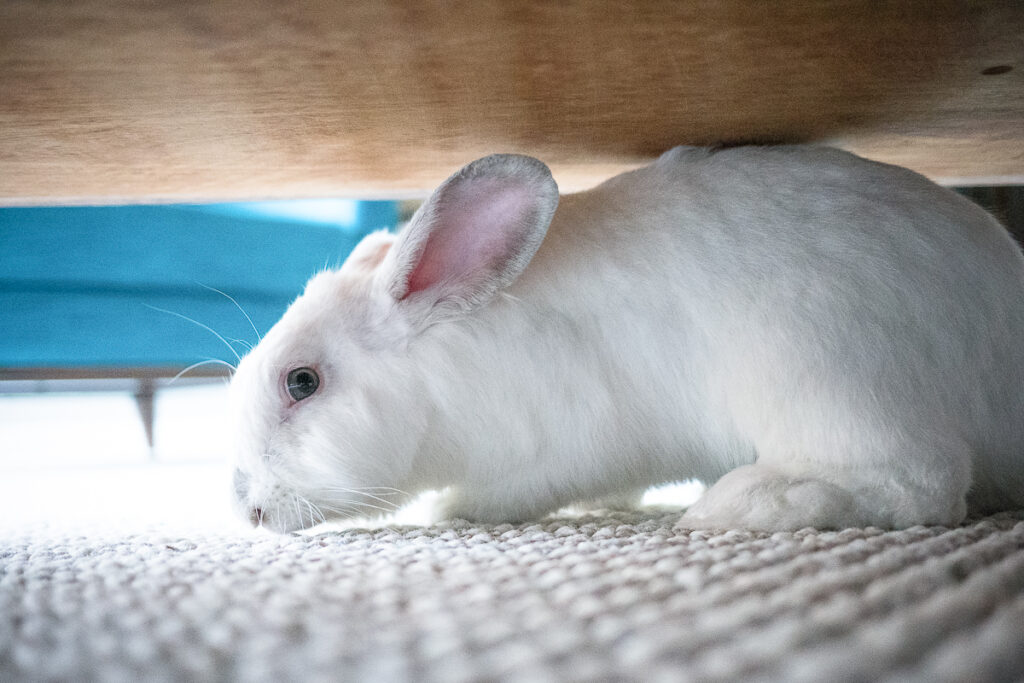Rabbits are prey animals, and specifically wild rabbits are vulnerable to predators on a daily basis. As descendants and cousins to wild rabbits, domesticated rabbits like your rabbit instinctively hide illnesses and injuries to avoid their predators. Unfortunately, when domesticated rabbits hide their symptoms, it misleads their caretakers into thinking all is well and can prevent prompt medical attention.
Be observant of each rabbit’s “normal” behaviors
Preventing and detecting illness and injury are just some of the reasons to house rabbits indoors. Rabbits who live indoors are easier to observe and they are less likely to be exposed to predators, parasites, and infections. On a daily basis, be attentive to norms and subtle changes in your rabbit’s behavior, including eating, litter box habits, and social interactions. When you know what is “normal” for your rabbit, you’ll be more likely to notice when something is “off.”
The best way to prevent health conditions from escalating is to find a rabbit-experienced veterinarian before your rabbit gets sick. When your rabbit is not feeling well, you need find help quickly and you won’t have time to “shop” for a vet. If you are ever unsure about your rabbit’s health, call your veterinarian for advice.
Please refer to SDHRS’s illness protocol here.
Signs your rabbit might be ill or injured
These symptoms and behaviors are signs that your rabbit may be sick or injured, and you need to consult their veterinarian as soon as possible.
Loss of appetite or lethargy: If your rabbit refuses his usual fresh food or favorite treats, and seems to be acting lethargically, you should call your rabbit’s veterinarian right away. Even missing one meal could be a sign of a serious illness, and time is of the essence in treating your rabbit. Not eating is one of the signs of gastrointestinal stasis (GI stasis), a common and serious health condition. Learn more about GI stasis here.
Tooth grinding: Audible tooth grinding is a sign of pain. Note: This tooth grinding is different from the softer “tooth purring” you may feel when you pet your rabbit’s head.
Change in body temperature: Rabbits regulate body temperature by their ears. Noticeably hot or cool ears could indicate a fever or a drop in body temperature. This, paired with other warning signs, will warrant a trip to the vet.
Unusual poop (fecal droppings): A healthy digestive tract will produce an abundance of large, round fecal pellets. Unusually small, irregularly shaped droppings or droppings strung together with fur (or carpet fibers) may indicate a problem. If you find the litter box has no new droppings in it after several hours, a visit to the vet is needed to see if your rabbit could have a blockage.
Blood in the urine, bladder sludge, straining to urinate: Healthy urine in rabbits can be a variety of colors. All of these are serious health issues, so take your rabbit to the veterinarian if you notice:
- Certain foods can turn urine reddish, but actual blood in the urine can be a sign of bladder infection, urinary stones, or cancer.
- If you notice a white, sludgy substance in their urine, this could be a sign of bladder sludge, a buildup of excess calcium in the bladder that can lead to bladder stones or infections.
- If your rabbit is straining to urinate or is “leaking” puddles outside of the litter box, you should be concerned.
- You may also notice “urine burn” or “urine scald,” which is caused when urine-soaked fur keeps the skin underneath damp and irritated.
Lumps and bumps: Abscesses and tumors can be very serious and should be checked by your veterinarian as soon as possible. Sudden lumps under the skin could be a sign of serious and fast-growing cancers.
Runny eyes or nose, labored breathing, or chronic sneezing: These could indicate an upper respiratory infection, a blocked tear duct, teeth problems, or other conditions. See your veterinarian right away.
Wet chin or drooling: This is often a sign of teeth problems, such as an abscess, spurs, or malocclusion. You may notice a decrease in appetite and decreased ability to eat hard foods. Tooth problems can lead to infection of the jaw. In some cases, your rabbit’s teeth may need to be trimmed regularly. In severe cases, teeth may be pulled.
Excessive itching or scratching, head shaking: This is commonly a sign of fleas or mites, which can be transferred from other pets in the home:
- Fur mites form patches of dry, flaky skin and missing fur. In some ear mite cases, scabs form in the ear canal.
- Flea infestations can kill companion animals by spreading illnesses or causing anemia. Use a flea comb and consult your vet about treatment. (Do NOT use Frontline, which has been linked to rabbit deaths.)
Bare, raw skin on heels: This is is called sore hocks or pododermatitis and occurs when hair is worn down to bare skin, or in severe cases, to the bone. See your veterinarian for treatment. Problems arise when an open wound forms, which is susceptible to infection. Possible causes include wire-bottom cages, rough carpet or flooring, damp resting boards, wet pet beds, larger body size or weight, or dirty litter boxes.
Loss of balance or a head tilt: This is most often a sign of an inner ear infection. This can occur very suddenly. Although treatment can be lengthy, head tilt may be cured or reduced if treatment is begun quickly. Head tilt can also be caused by a common parasite called E. cuniculi, which must also be treated immediately by a rabbit-savvy veterinarian.
When in doubt, call your veterinarian.
Is My Rabbit Having An Emergency?
The biggest indicator that your rabbit needs emergency medical care is a loss of appetite and lethargy.
Every rabbit has lower-energy days now and then, but if your rabbit refuses their usual fresh food — or their favorite treats — and seems particularly lethargic, you should call your rabbit’s veterinarian right away. We encourage you to observe your rabbit’s behavior, activity level, and droppings daily. Each rabbit is different and knowing what is normal behavior for your rabbit could save his life.
Other signs of emergency include:
- Loss of balance
- Head tilt
- Seizure(s)
- Fever or low body temperature (healthy ears should be warm to the touch)
- Audible tooth grinding and pained posture
- Breathing through the mouth
- Bleeding or open wound (big or small)
- Broken bone or significant fall (rabbits have delicate bones)
- Diarrhea
- Blood in urine
- Severely distended stomach (bloat)
- Ingestion of something poisonous to rabbits
- If your rabbit is in noticeable pain of any kind, consider this an emergency
If your rabbit is experiencing any of these symptoms, you need to call their veterinarian and the nearest rabbit-savvy emergency medical care provider as soon as possible.
Further Reading
- Common Medical Concerns
- San Diego Companion Rabbits Illness Protocol
- Help! My rabbit is sick and I can’t reach a vet.
- How to get a second opinion

